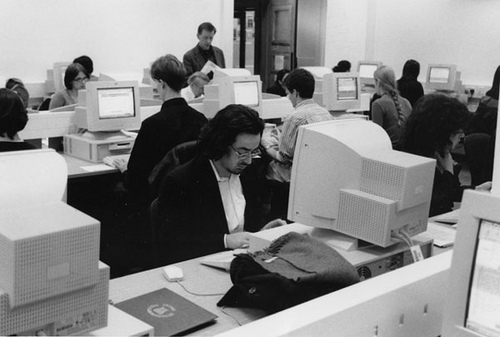In the previous post, I spoke about a few major things that had been said about the Internet at the UN before the publication of the report that inspired this post series. I said a link between Internet access and development had been accepted, but that human rights and Internet had yet to be explicitly addressed.
Now, human rights is, for obvious reasons, a topic that gets discussed across all the organizations that form the UN. However, the best source on formal discussions is the Human Rights Council.
When we look at what has been said about the Internet at the HRC, we can easily see the stance they take on the dilemma I explained in the first post. The HRC does not see the Internet as something really so novel that it needs to be discussed on its own; they instead discuss it as it relates to existing rights.
In fact, they discuss it as it relates to a very specific right. Even though many of us would relate Internet access to the right to education, this topic is covered instead in the discussion of the right/freedom of opinion and expression.
Article 19 of the Universal Declaration of Human Rights:
Everyone has the right to freedom of opinion and expression; this right includes freedom to hold opinions without interference and to seek, receive and impart information and ideas through any media and regardless of frontiers.
Now, the purpose of this post is not to analyze this right to the core, but we need to take something important into consideration: this right has derived into what we call ‘right/freedom of information’, which allows us to conceive freedom of speech as something that happens in two dimensions: one that allows individuals to be sources of information, and one that allows them to receive it.
Why is this maybe obvious fact so important? Because it is thanks to its acceptance that we can realize that State censorship happens not only when the mouths of some are covered so that they will not speak, but also when the ears and eyes of others are covered so that the first ones will not be heard.
This (finally) takes us to the actual report. It was written by Guatemalan Frank La Rue, a man who has devoted many years to the human rights struggle (specializing in the legal aspect of things), and who now voluntarily (i.e. not paid with your tax money) serves as a Rapporteur for the HRC in the field of promotion and protection of freedom of opinion and expression.
In this report, La Rue gives reasons for which he thinks the Internet stands out from other media: the extension of its use is unprecedented in human life; its potential of interactivity, which makes it especially valuable in societies where there are no independent media; its high speed, relative low cost and unlimited broadcast capacity (as compared to the radio, for example); its possibility of anonymous participation. All of these give it the potential of human-rights-related mobilization that had previously been only seen in mass media.
La Rue does take advantage of the opportunity to advocate for the promotion of universal access to the Internet in the recommendation he issues: ‘The Special Rapporteur is thus concerned that without Internet access, (…) marginalized groups and developing States remain trapped in a disadvantaged situation, thereby perpetuating inequality both within and between States. As he has noted previously, to combat situations of inequality it is critical to ensure that marginalized or disadvantaged sections of society can express their grievances effectively and that their voices are heard. The Internet offers a key means by which such groups can obtain information, assert their rights, and participate in public debates concerning social, economic and political changes to improve their situation.’
However, the most important contribution he makes is not in this regard, but in the discussion of Internet access as a means for the freedom of opinion and expression. Throughout the report, he analyzes certain behaviors seen in governmental actions that can be understood to be violations of this right.
Among these behaviors, he cites the following (some surprisingly, maybe others not so): voluntary blocking or filtering of information (at the government level; remember we’re discussing governmental behavior); the criminalization of legitimate expression that is done online (like imprisoning bloggers as for ‘terrorism’); the imposition of content responsibility on third parties (we’ll take your site down if one of your users posts x); the use of prohibition of Internet access to punish things like copyright infringements; cyber-attacks (talking government level, again); and the failure to implement data security legislation.
Many will think that that’s pretty unexciting after the prospect of ‘the Internet being declared a human right’, but it’s actually a pretty big deal. For a long time, there has been an open gap between freedom of expression and Internet access. Could countries like France and the US be consistent with their freedom of speech ideals while putting pressure on internet providers or banning Napster users from it to give them a lesson? Some said yes. This report indicates that no.
‘The framework of international human rights law remains relevant today and equally applicable to new communication technologies such as the Internet’, adds La Rue. This is a big contribution.
So no – you cannot stop paying Comcast, nor sue your governors for not putting free wifi in your park (just move to Geneva). But you can keep surfing with the peaceful knowledge that Article 19 has got your back, because yes: the powers that be wrote it anticipating developments in media technologies that could eventually become as big as the Internet is today.
